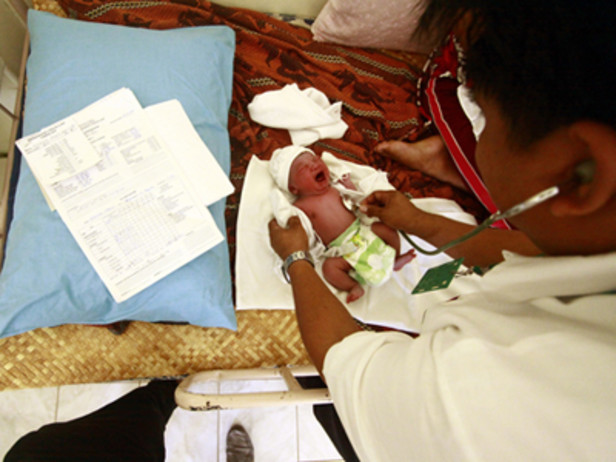
Philippine President Benigno Aquino signed into law in June the long-awaited revisions to the National Health Insurance Act, which now places the country’s most vulnerable citizens under the umbrella of the government’s cash-strapped national health insurance program.
The amended law now technically puts universal health coverage within reach of 95 million Filipinos, a goal shared with other Asian neighbors like Indonesia and India.
Republic Act 10606 creates a socialized health insurance program offering free health care services to indigents and prioritizing the needs of the underprivileged, elderly, persons with disabilities, women and children under PhilHealth, the government’s national health insurance scheme.
Funds will come from the so-called “sin tax” revenues from cigarette and alcohol sales.
The vision: To attain all health-related Millennium Development Goals in the country, especially curbing maternal mortality and raising contraceptives use and births attended by skilled health works, where the Philippines has been lagging behind according to official statistics.
“It looks to be a good thing from the point of view of protecting the health and finances of disadvantaged groups in the Philippines by subsidizing health coverage through PhilHealth for those unable to pay premiums, and for those in the informal sector who would have difficulty paying premiums,” Marty Makinen, managing director of the Results for Development Institute, told Devex.
However, the future of universal healthcare coverage in the Philippines is still not set in stone while the government mulls over its implementing rules.
Challenges, prospects
Yvonette Serrano Duque, World Vision’s child well-being programing manager in the Philippines, told Devex that while the new policy is a good start, challenges remain for its implementation, like popularization and advocacy, possible politicization and eligibility issues.
“What budgets are we talking about to support the poorest of the poor? How are we able to categorize and ensure [that they are indeed the] poorest of the poor?,” she asked.
Other universal health coverage schemes around the world have faced the same problem of finding the best way to enroll beneficiaries, according to Makinen, who added that physical access to services can also be a barrier.
“This subsidization, while very important, might not yet make the use of health services completely equitable,” he said.
Management Sciences for Health president and CEO Jonathan Quick agreed that on its own, expanding social health insurance does not guarantee equity in health.
“UHC isn’t just about financing. Nobody gets better until service delivery improves,” said Quick, who in an earlier exclusive opinion for Devex urged that UHC be included as a goal in the U.N. post-2015 development agenda.
Quick called for better monitoring by the government to confirm that the beneficiaries are indeed using services, that those services are being delivered well and, ultimately, that people’s health is improving. This entails, he said, enhanced systems for data collection and management.
From her experience working on the field, Duque urged the government to:
- Create more health facilities reaching far-flung areas within the country and provide trained personnel to manage them
- Boost the sanitation of health facilities
- Ensure that there are available licensed health service providers in every health facility
- Make medical instruments and supply of medicines available
- Extend the coverage of illnesses and diseases in the policy
- Include preventive care in the coverage of the insurance.
‘Sin taxes’
Funding for the new universal health coverage plan in the Philippines will come from national revenues in tobacco and alcohol excise tax — a controversial approach that has its own share of proponents and critics.
“It is good to have a protected source of funding, but might be better if the funding were protected within general revenues rather than depending on the continuation of behaviors that it would be better to moderate or stop altogether like smoking and the consumption of alcohol,” said Makinen.
Quick, on the other hand, believes that progress towards UHC always requires more public spending on health, often translating into a hike in tax revenues from any available source.
“Sin taxes can be regressive, but in this case the funding is going towards better coverage for vulnerable groups. I think we’ll see more and more countries turn to these targeted taxes as they realize how much they have to increase resources to address the epidemic of chronic diseases related lifestyle factors,” he said.
See more latest news From Asia on Automobile,Technology, Agriculture, Finance, Lifestyle, Healthcare
Follow me on twitter for more Daily updates
For more reports from Asia www.search.dowellresearch.com
For any Market research consulting services www.dowellresearch.com
No comments:
Post a Comment